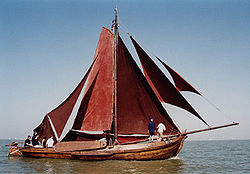botter
English
Pronunciation
- (General American) IPA(key): /ˈbɑtɚ/
- (Received Pronunciation) IPA(key): /ˈbɒtə/
Audio (Southern England): (file) - Rhymes: -ɒtə(ɹ)
Etymology 1
Noun
botter (plural botters)
- (Internet) One who operates a bot (automated software process).
- 2008, New Scientist, volume 200, numbers 2682-2688, page 28:
- It is estimated by industry and leading botters that only around 1 in 10 players using bots make a profit, mainly in low-stakes games.
See also
Etymology 2
From bottom (“backside”).
Noun
botter (plural botters)
- (slang, childish) A homosexual man.
- 2009, Mark Ritchie, Living By The Sword, page 189:
- They told us about anal sex, but it was something that gay men did. And when you're twelve, gay men are botters, benders, shirt lifters and arse bandits.
References
- Tony Thorne (2014) “botter”, in Dictionary of Contemporary Slang, 4th edition, London, : Bloomsbury
Anagrams
Afrikaans
Alternative forms
Etymology
From a dialectal variant of Dutch boter, from Middle Dutch bōter, from Old Dutch *butera, from Latin būtȳrum, from Ancient Greek βούτυρον (boúturon).
Pronunciation
Noun
botter (plural botters, diminutive bottertjie)
- (uncountable) butter; a soft, fatty foodstuff made from the cream of milk
- butter type
- Ons het 'n klomp gegeurde botters beskikbaar.
- We have a lot of flavoured butter /butters available.
- (chemistry, dated) butter; any specific soft substance
Derived terms
Verb
botter (present botter, present participle botterende, past participle gebotter)
Dutch
Pronunciation
Etymology 1

Uncertain. Perhaps an action noun from bot (“flounder”) + -er after a type of fish fished for with the vessel, or from bot (“blunt”) from the characteristic shape of its bow.
Noun
botter m (plural botters, diminutive bottertje n)
- a type of Dutch fishing vessel with a characteristic hull
Etymology 2
See the etymology of the corresponding lemma form.
Adjective
botter
French
Etymology
Pronunciation
Verb
botter
- to kick
- (slang) to please, to like
- Synonym: plaire
- Ça te botterait d'aller au ciné?
- Would you like to go the cinema?
Usage notes
In the sense please it functions syntactically like plaire, viz. it takes an indirect object and may be translated into English as like, exchanging the subject and object.
Conjugation
| infinitive | simple | botter | |||||
|---|---|---|---|---|---|---|---|
| compound | avoir + past participle | ||||||
| present participle or gerund1 | simple | bottant /bɔ.tɑ̃/ | |||||
| compound | ayant + past participle | ||||||
| past participle | botté /bɔ.te/ | ||||||
| singular | plural | ||||||
| first | second | third | first | second | third | ||
| indicative | je (j’) | tu | il, elle, on | nous | vous | ils, elles | |
| (simple tenses) |
present | botte /bɔt/ |
bottes /bɔt/ |
botte /bɔt/ |
bottons /bɔ.tɔ̃/ |
bottez /bɔ.te/ |
bottent /bɔt/ |
| imperfect | bottais /bɔ.tɛ/ |
bottais /bɔ.tɛ/ |
bottait /bɔ.tɛ/ |
bottions /bɔ.tjɔ̃/ |
bottiez /bɔ.tje/ |
bottaient /bɔ.tɛ/ | |
| past historic2 | bottai /bɔ.te/ |
bottas /bɔ.ta/ |
botta /bɔ.ta/ |
bottâmes /bɔ.tam/ |
bottâtes /bɔ.tat/ |
bottèrent /bɔ.tɛʁ/ | |
| future | botterai /bɔ.tʁe/ |
botteras /bɔ.tʁa/ |
bottera /bɔ.tʁa/ |
botterons /bɔ.tʁɔ̃/ |
botterez /bɔ.tʁe/ |
botteront /bɔ.tʁɔ̃/ | |
| conditional | botterais /bɔ.tʁɛ/ |
botterais /bɔ.tʁɛ/ |
botterait /bɔ.tʁɛ/ |
botterions /bɔ.tə.ʁjɔ̃/ |
botteriez /bɔ.tə.ʁje/ |
botteraient /bɔ.tʁɛ/ | |
| (compound tenses) |
present perfect | present indicative of avoir + past participle | |||||
| pluperfect | imperfect indicative of avoir + past participle | ||||||
| past anterior2 | past historic of avoir + past participle | ||||||
| future perfect | future of avoir + past participle | ||||||
| conditional perfect | conditional of avoir + past participle | ||||||
| subjunctive | que je (j’) | que tu | qu’il, qu’elle | que nous | que vous | qu’ils, qu’elles | |
| (simple tenses) |
present | botte /bɔt/ |
bottes /bɔt/ |
botte /bɔt/ |
bottions /bɔ.tjɔ̃/ |
bottiez /bɔ.tje/ |
bottent /bɔt/ |
| imperfect2 | bottasse /bɔ.tas/ |
bottasses /bɔ.tas/ |
bottât /bɔ.ta/ |
bottassions /bɔ.ta.sjɔ̃/ |
bottassiez /bɔ.ta.sje/ |
bottassent /bɔ.tas/ | |
| (compound tenses) |
past | present subjunctive of avoir + past participle | |||||
| pluperfect2 | imperfect subjunctive of avoir + past participle | ||||||
| imperative | – | – | – | ||||
| simple | — | botte /bɔt/ |
— | bottons /bɔ.tɔ̃/ |
bottez /bɔ.te/ |
— | |
| compound | — | simple imperative of avoir + past participle | — | simple imperative of avoir + past participle | simple imperative of avoir + past participle | — | |
| 1 The French gerund is usable only with the preposition en. | |||||||
2 In less formal writing or speech, these tenses may be found to have been replaced in the following way:
(Christopher Kendris , Master the Basics: French, pp. 77, 78, 79, 81). | |||||||
Derived terms
Further reading
- “botter”, in Trésor de la langue française informatisé , 2012.
Norman
Etymology
Verb
botter
